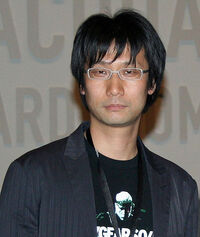
Kojima Hideo
Kojima Hideo (小島 秀夫) is a Japanese video game designer formerly employed at Konami, and a friend of SUDA51's. Formerly the vice president of Konami Computer Entertainment Japan, he is currently Managing Director Operating Officer and Studio Head of Kojima Productions. He is the creator and director of a number of successful games, including the Metal Gear series, Snatcher, and Policenauts. He has also produced both the Zone of the Enders and Boktai series. Kojima is consistently named by fans and industry experts alike as being one of the most influential and innovative video game directors and writers of all time, as well as being on many all time director top ten lists. Kojima worked with SUDA51 on Sdatcher, which based off of Kojima's game Snatcher.
Biography[]
Kojima grew up early in life watching movies with his parents. While studying economics in college, Kojima found himself playing video games during his free time mainly games on the Famicom. In his fourth year in college, Kojima surprised colleagues by announcing his intentions to join the video game industry, despite initially having ambitions of becoming a film director. Kojima has cited Yuuji Horii's Portopia Renzoku Satsujin Jiken as well as Miyamoto Shigeru's Super Mario Bros. as the games that inspired him to make this decision. Kojima joined video game publisher Konami's MSX home computer division in 1986 as a designer and 'planner'. Kojima's gameplay ideas were often overlooked initially, and due to his lack of familiarity with programming was repeatedly snubbed for his failures in his initial years at Konami. At one point Kojima considered leaving the company, but stuck on.
His first released game was Metal Gear. It was released in 1987 for the MSX2 home computer in Japan and parts of Europe. The game centers around a special forces operative codenamed Solid Snake, who is sent to the fortified state of "Outer Heaven" to stop a nuclear equipped walking tank known as "Metal Gear." Metal Gear is one of the earliest examples of the stealth action game genre, where avoiding encounters from the enemies is emphasized over direct combat. His next project was the graphic adventure game Snatcher, released for the NEC PC-8801 and MSX2 computer platforms in Japan in 1988. The game, heavily influenced by the movie Blade Runner, centers around an amnesiac detective who faces a race of cyborgs (the titular Snatchers) that kill their victims, copy their likeness and assume their place in society. While Kojima and his team wrote the entire story of the game, they were forced to leave out the final act of the game due to time constraints.
In 1994, Kojima released Policenauts, a film noir/sci-fi-themed adventure game set in a space colony, for the NEC PC-9821. Kojima oversaw the subsequent ports released for the 3DO in 1995; and the PlayStation and Saturn in 1996, which all featured animated cut-scenes not in the PC-98 release. No English localization of the game was produced, despite aborted plans to localize the Saturn version. With the release of Metal Gear Solid in 1998 for the PlayStation, Kojima became an international celebrity among the video game media. Metal Gear Solid was the first in the Metal Gear series to use 3D graphics and voice acting, which gave a more cinematic experience to the game. MGS was highly regarded for its well-designed gameplay and for its characters and storyline, which featured themes of nuclear proliferation and genetic engineering. He continued to direct the series through to its completion, Metal Gear Solid 4: Guns of the Patriots for PlayStation 3.
He received a lifetime achievement award at the MTV Game Awards 2008 in Germany. In his speech, he explained in English: "I have to say, even though I received this award, let me state that I will not retire. I will continue to create games as long as I live."
Game Designer Mentality[]
"Storytelling is very difficult. But adding the flavour helps to relay the storytelling, meaning in a cut scene, with a set camera and effects, you can make the users feel sorrow, or make them happy or laugh. This is an easy approach, which we have been doing. That is one point, the second point is that if I make multiple storylines and allow the users to select which story, this might really sacrifice the deep emotion the user might feel; when there's a concrete storyline, and you kind of go along that rail, you feel the destiny of the story, which at the end, makes you feel more moved. But when you make it interactive - if you want multiple stories where you go one way or another - will that make the player more moved when he or she finishes the game? These two points are really the key which I am thinking about, and if this works, I think I could probably introduce a more interactive storytelling method." -Kojima Hideo